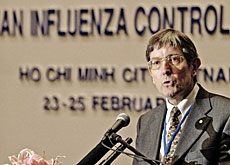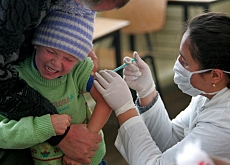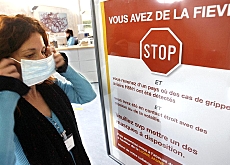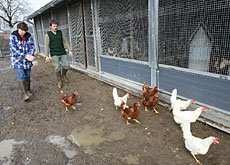How bird flu can be stopped?

Preventing the spread of bird flu to domestic poultry should be feasible, a Swiss expert at the United Nations Food and Agriculture Organisation, tells swissinfo.
Samuel Jutzi, director of the FAO’s Animal Production and Health Division, advocates the use of vaccination in domestic poultry, under strict conditions, saying its effectiveness has already been demonstrated in some countries.
swissinfo: How effective are the measures we have seen so far – confining poultry to stalls, and limited vaccinating of poultry stocks – likely to be against preventing the spread of bird flu to domestic poultry?
Samuel Jutzi: If confinement of poultry indoors is complemented with the necessary biosecurity measures – making sure that the people handling these animals and the inputs [food and straw] are safe and clean – these poultry establishments can be effectively protected against the virus.
The transition to vaccination which was allowed by the European Commission for certain parts of poultry production in France and the Netherlands is a very sound decision…
It is feasible to push the virus out of domestic poultry, and there are examples of countries which have achieved the elimination of the virus.
For four months we have observed no outbreaks in Vietnam, and there have also been no more human cases during that period.
swissinfo: In Switzerland, the authorities have ruled out vaccinating poultry, saying it lessens the likelihood that the virus will be detected. Is that wise?
S.J.: I would not want to judge in any way the decision of the Swiss Veterinary Office. Each country’s situation is different and each authority has to assess the risk.
With respect to vaccinations, we do not have any doubt that they are effective. However, a vaccination campaign has to be accompanied by very careful monitoring, for instance by putting into flocks so-called “sentinel” birds, which have not been vaccinated.
swissinfo: Do viruses of this nature typically cross over to other species? Presumably the risk increases the more other species are exposed to the virus?
S.J.: The H5N1 influenza virus is an RNA virus, which tends to mutate rather dynamically and to adjust to new hosts. And the transmission of the virus has been observed for some time, most recently in cats in Europe.
The species barrier is being crossed, also to humans and to pigs. That is of particular concern because pigs and humans can be the so-called “mixing vessels”. If they are both infected with a human and an avian influenza virus, there may be a crossover. In that case, the combination of the genetic material would then result in a virus which would be transmissible from human to human and have the same mortality rate of H5N1.
So the concern is indeed justified. We are currently looking at the role of cats in the crisis, particularly in Indonesia, and it is not excluded that cats may have a role that has been underestimated in the epidemiology of the disease.
swissinfo: Vaccines are being developed against a possible human pandemic. Are these likely to be effective? And given the likely demand is it realistic that enough can be produced?
S.J.: There are several types of vaccine which are being produced but it is not known whether these would protect humans effectively if there were a pandemic.
On a more optimistic note, fears of a human pandemic mean massive investment in research has been made, so our industry should be in a much better position to produce vaccines more effectively and rapidly. Although the quantities required would be such that still there would be enormous time lags involved.
swissinfo: Some experts have warned that avian flu is likely to become endemic among wild birds in Europe. Do you agree?
Samuel Jutzi: This question is rather tricky, and it is not always clear whether a disease has become endemic in a particular area or not.
H5N1 is a rather nasty virus and normally a virus which is so virulent cannot easily maintain itself because it kills the host and if it does so, it obviously cannot survive.
So there is some likelihood that, unless there are wild birds which can pick up the virus and not die of it, that the virus may not be in position to become endemic in wild birds in Europe. But very little is known as to which species might indeed be picking up the virus and shedding it without being killed.
swissinfo-interview: Jonas Hughes
Switzerland has reported ten cases of avian flu among wild birds, but no domestic foul have been infected.
All poultry has been kept indoors since February 20, but the Federal Veterinary Office has no plans to vaccinate domestic birds.
Neighbouring France is the only European Union country to have reported a case of bird flu among poultry, and has started vaccinating birds.
Germany has ordered that all domestic cats be confined indoors, after several contracted the virus, presumably through eating dead birds.
The FAO’s Animal Production and Health Division works to improve and develop methods of farming livestock worldwide.
Its priority is to ensure that animal products are safe for human consumption.
It also seeks to help small farmers in poorer countries sell their products in global markets.

In compliance with the JTI standards
More: SWI swissinfo.ch certified by the Journalism Trust Initiative



You can find an overview of ongoing debates with our journalists here. Please join us!
If you want to start a conversation about a topic raised in this article or want to report factual errors, email us at english@swissinfo.ch.